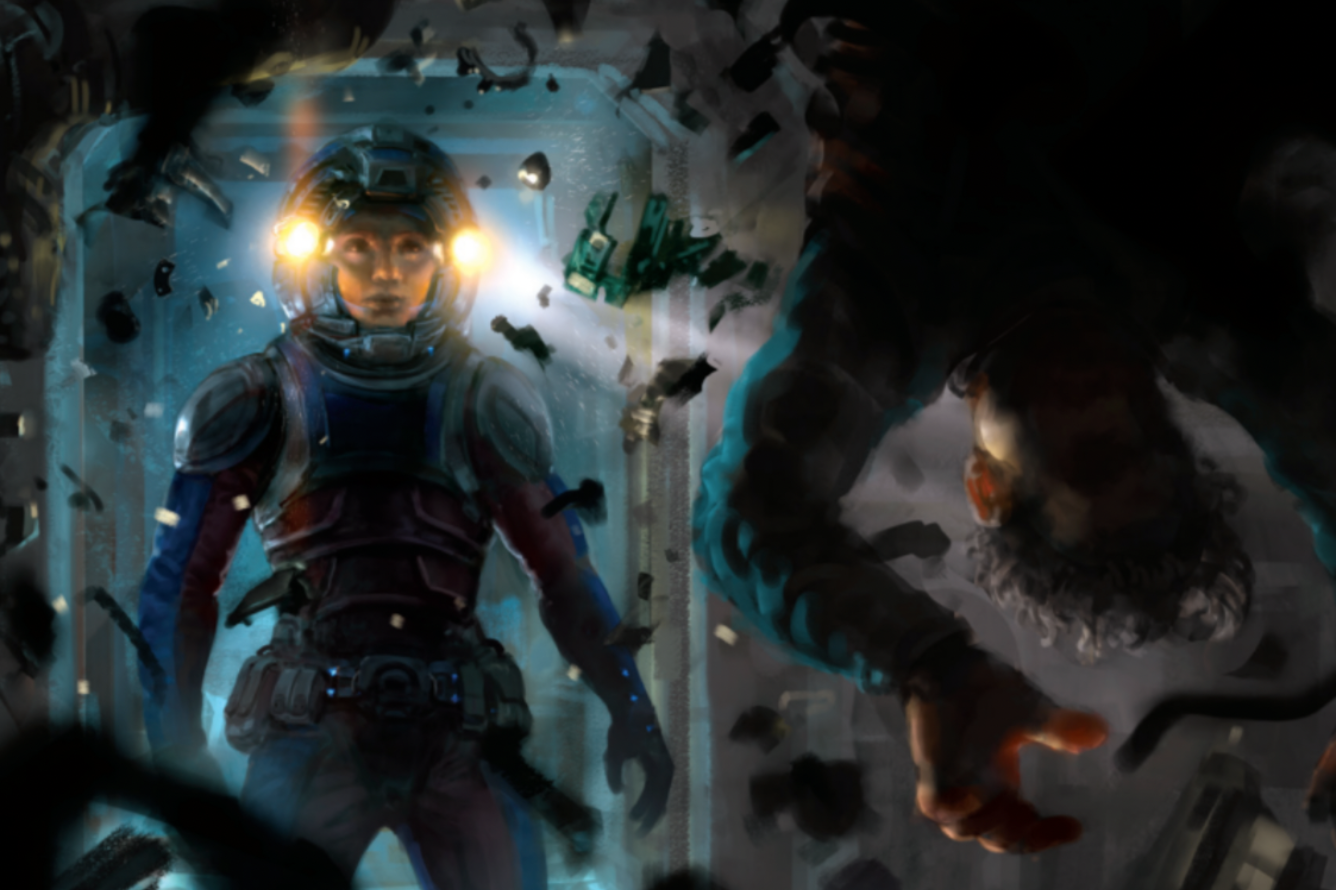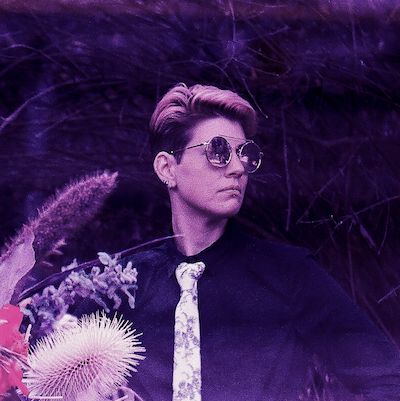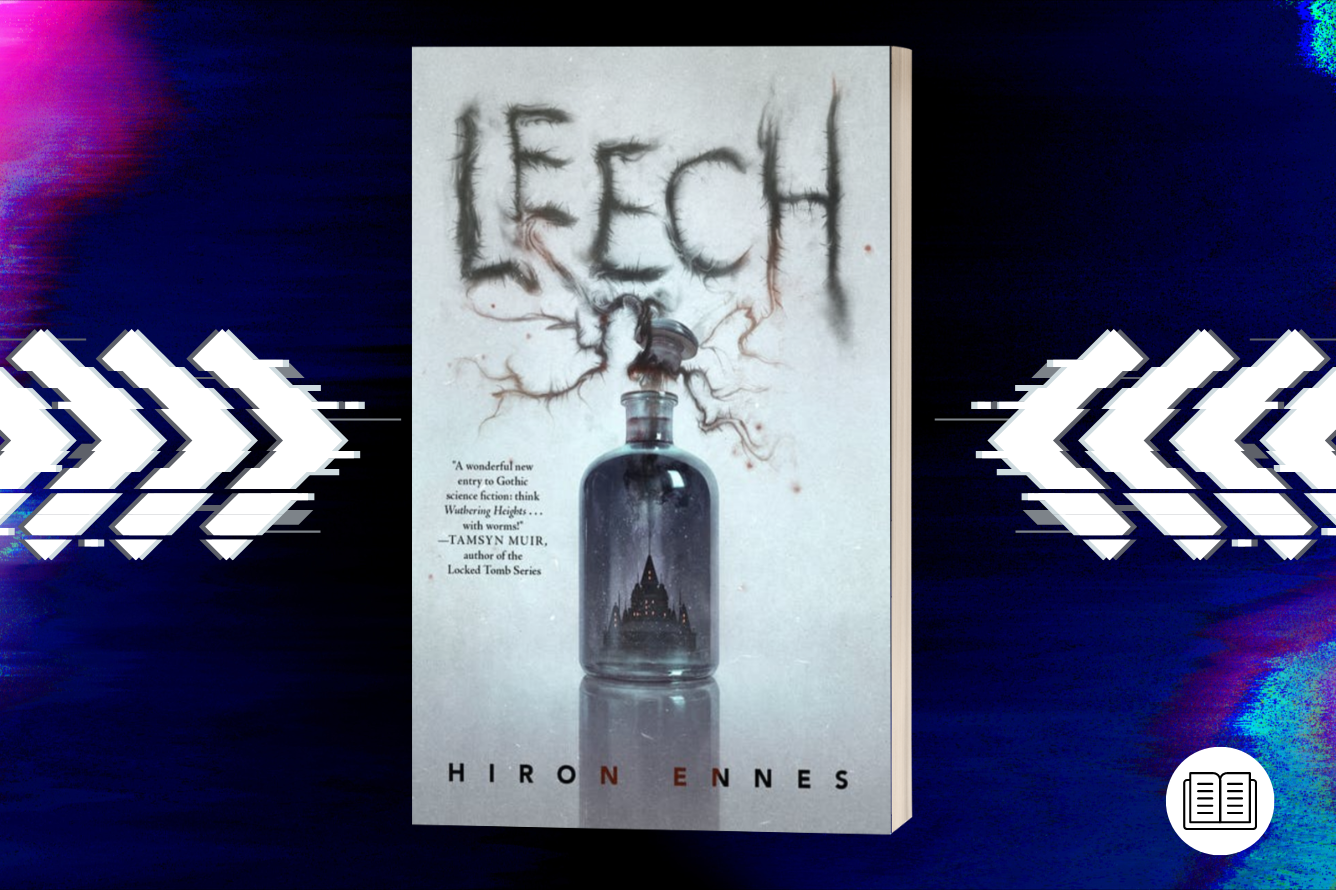In an isolated chateau, as far north as north goes, the baron’s doctor has died. The Interprovincial Medical Institute sends out a replacement. But when the new physician investigates the cause of death, which appears to be suicide, there's a mystery to solve. It seems the good doctor was hosting a parasite. Yet this should have been impossible, as the man was already possessed. For hundreds of years, the Institute has grown by taking root in young minds and shaping them into doctors, replacing every human practitioner of medicine.
The Institute is here to help humanity, to cure and to cut, to cradle and protect the species. Now it seems they have competition. For in the baron’s icebound castle, already a pit of secrets and lies, the parasite is spreading . . .
These two enemies will make war within the battlefield of the body. Whichever wins, humanity will lose again.
Chapter I
The sight of this old train car saddens me, though I cannot quite articulate why. There is something unnamable about the rattling of the empty wooden seats, so like the pews of a deserted church, that puts me in a lonely humor. It is an unusual feeling, since I have never in my life been alone.
Jagged mountains rise and fall outside the window, dotted with white trees and the occasional lodge long since abandoned to the wild. It has been one hour and forty-two minutes since the last snow-shrouded sign of civilization crawled across the landscape, and it will be fifty-four minutes before the next appears. This is not accounting for delays, accidents, breakdowns, avalanches, or seismically induced derailments.
The only other occupant of the car is a young boy, bundled so heavily he resembles a sphere more than a child. He sits alone because he failed to follow his mother off the train at the penultimate stop, but he does not appear distressed. The conductor has promised to deposit him at the correct station on the return south, and he shrugged in reply, biting shyly at the forefinger of a well chewed glove.
The train stops twice so workers can clear snow from the tracks, adding, according to my timepiece, forty-one minutes to the journey. It is not so deep into winter that such a delay will prove fatal, but I will arrive on the dangerous side of dusk. Perhaps that is for the better. The man I plan to meet at the station is not likely to be punctual, especially since he does not expect me. He may not even yet know of the death that brings me north.
The snow-laden firs bow their heads and shed motes of light as the sun slips between two western peaks. The boy squints out the window, drawing intricate outlines of mountains in his condensed breath and wiping them away with equal enthusiasm. I study him at play, noting his movement and development, his flushed cheeks, the herpetic sores at the corner of his mouth. He is a charming creature.
He meets my gaze and reddens, balling his hand in the palm of his four-fingered right glove. I suspect come nighttime the ride will only get colder, so I remove my own gloves and offer him a trade. Wordlessly, he compares them to his current pair. He slips his hand inside, and finding them to be close enough to his own size, accepts. As the train once again bellows and lurches, his complacent smile reveals dark gaps of missing teeth. He spends the rest of the trip removing the gloves, twisting the fingers in knots, untwisting, reversing them, and wearing them again. By the time my destination comes into view, he is chewing away at one leather forefinger.
The train whines to a stop. As I bid farewell to the child, I suddenly long to trade places with him, as easily as we have traded gloves. I would like to ride back south in his place, to assume his unworried demeanor, to occupy the capricious brain developing in his skull. Perhaps, one day, I will.
But for now, I must address my own mind. I must follow the eddies of darkness where the flow of my thoughts has been interrupted, where a gap has opened and swallowed a portion of my memory. Only a corpse is left, a body I should have seen die, but whose agonal moments slipped past with nothing but a tense, vague unsettlement.
I collect my things and disembark. Workmen drag several dozen boxes of supplies through the snow, and I follow their tracks to the three-walled shack that passes for a railway station. The shelter offers little respite from the cold, and I shiver between crates and containers, massaging a numb forefinger and curling my frozen toes in their inadequate shoes. The train reverses course, black smoke billowing in its wake, and disappears back into the maze of mountains. Silence falls with the dusk, and the encroaching shadows color the snow an endless, featureless blue.
Baker arrives with predictable lateness, and in his usual manner: bathed in the exhaust of his snow-treading vehicle, balancing sidesaddle on a torn foam seat, with a small branch of pine—a poor substitute for the cigarilles he’s vowed to eschew—poking aslant from his frosty beard. At his back creaks a sled of his own making, a rickety contraption of wood and metal on which he hauls supplies between the station and the town.
Suppressing an unexpected pinch of anxiety, I watch him rattle up to the shack, smoke wheezing from the machine’s trembling tailpipe. I raise a hand in greeting.
Baker slides from the seat. He looks to his left, then his right, as if hoping to find someone who can explain my presence. He, of course, doesn’t recognize me.
“You’re of the Institute, I s’pose,” he says.
I nod.
“Hell of a fast arrival. Been but two days back the château sent the letter.” He speaks hard Franco, and though this young tongue of mine is unused to its phonemes, I am familiar with the language. “Just nay thought—lor, never mind. I’m Baker.” I pretend I do not already know. He extends his hand and I take it.
“You lost a finger there,” he says. “Can quire summore gloves in town. Nay far. Any luggage?”
“No.”
He raises a bushy eyebrow. “Supe, crawl in the back. I can come tomorrow for these. Wild animals nay stealing the baron’s new porcelain while we’re away.” He pats a crate with a furred glove and motions for me to climb into the dilapidated sled. When I am safely inside, he blows two pillars of smoky, condensed breath from his nostrils and starts the engine.
I squint at the rusted track of the machine as it flings oil-stained snow, grooves glinting like knives, and I try not to imagine a body crushed under it, tangled and torn beyond recognition. I know better than to conjure such thoughts, but phobias, like immunities, are acquired early and are difficult to erase. Despite logical input from a conscious mind, a body fears what it fears.
The ride is unpleasant, but it is not long. In a few minutes an orchard of smokestacks appears beyond the treetops, ringed by the slanted tin roofs of miners’ homes. The pines part, ushering us down a corridor of crooked stone buildings braced with ice. We wind through the snowy streets, past half-buried warehouses, past belching chimneys and pumping turbines that are denied sleep even in the dead of winter, and up the slope of a looming hillside. At its crest, we cough to a halt before a wrought-iron gate. Two men emerge from a crumbling guards’ hut, one wielding a shovel and the other a rifle. They exchange a few words, glancing at me, then force the gate open on hinges rigid with cold. The taller one waves us in, gun dangling from his shoulder like a broken limb, and we sputter onto the unkempt, frozen grounds of the Château de Verdira.
Of a hundred windows, only a dozen are lit. The château, likely a sister to the luxury hotels that once dotted these mountains, has mostly crumbled into darkness, its outer wings abandoned to the elements or repurposed to house animals in winter. Only the central tower, a looming, crooked thing, is alive tonight. It arcs over us, as if bending to allow the single eye of the highest window—the baron’s, of course—to scrutinize approaching visitors. Bathed in the weak light of the manor, Baker leads me up the snowy steps to the oak doors. He raps thrice, and in a blur of marmot-furred coat, retreats to his vehicle. The engine roars, the gears scream, and he disappears into the dusk.
I knock twice more before a maid answers. She narrows her eyes at my inadequate topcoat and unfamiliar face, and wordlessly invites me out of the cold. Sylvie is her name, but she will introduce herself to me later, after I have proven trustworthy. For now, she saves the smiles and curtsies, and bids me wait under the jade dome of the foyer. I remove my hat and count the cracks running through the stone to pass the time, but only reach ninety-three before she returns to present me with the Baron de Verdira’s only son, Didier.
He barely resembles himself. His handsome face seems to have withered in my short absence, and behind the cracked glass of his pince-nez, his eyes are colored with fatigue.
“You must be the replacement,” he says. “I didn’t think you’d come for another few days, at least. And at this time of evening— sweetest hell, I hope you didn’t walk up from the station.”
“Baker was kind enough to escort me,” I say.
“Had I known you’d arrive so quickly I’d have sent someone to retrieve you. And certainly well before nightfall.” He attempts, valiantly, to smile. “You must be exhausted. I’ll have something hot made for you. Come rest in the salon and I’ll pour you a drink.”
I peel off my gloves and coat, dropping them into Sylvie’s outstretched arms. “I would much prefer to see the body first.”
“Surely that can wait.”
“I am afraid not, sieur.”
Didier’s eyes glide over mine, probing for the reasoning behind my urgency, but I have nothing to offer him. Somehow, I know even less than he does.
“If that is what you wish,” he says. “We’ve laid him out in the cold so—well, you’re no doubt familiar with the . . . process of decay.”
“I am.”
Didier lifts an oil lamp from its sconce and bids me follow, unaware that I have traveled these halls for years. He guides me through the distal veins of the château, through darkness thickened with cobwebs and dust. We wind down creaking staircases, past rows of rooms that have not seen an occupant in centuries, to a tall, unadorned metal door.
“I’ll get the houseboy to bring you his old tools, if you want to . . . open him up.” Didier struggles with the lock for a moment. “But with his wound, it’s not hard to guess how he died.”
I do not remember a wound of any sort. “Regardless, I would very much appreciate the tools.”
He nods and pushes the door open in a wave of freezing air. We step into what may have once been part of a kitchen, but now serves as meat storage. Legs, torsos, and strips and mounds of venison and pork hang from hooks in varying states of disassembly. Steel bars bend across crumbling sections of wall, keeping any wandering carnivores, including hungry townsfolk, from worming their way in. On an iron butcher’s table, supine and blue with cold, lies a body familiar to me.
At the sight of its sunken face and the dark puncture wound on its neck, a multitude of voices echo in my mind, some worried, others calm, all rational. A hundred mouths whisper twice as many questions, and for a moment—not the first in my life, though it is rare—I am at a complete loss.
“Who is responsible for this?” I ask.
“I have no idea,” Didier replies. He lingers by the door, eyes averted. “Nobody had anything against him, except for my father, perhaps. But he has something against everyone, and he can barely get out of bed to eat, much less drive a scalpel into someone’s throat. I can’t help but suspect . . .” Didier pauses. “I suspect he did this to himself.”
I say nothing. I cannot confirm nor controvert his theory, since I have no recollection of the event. I was not there, and that is what terrifies me.
“I’ll be back in a moment,” Didier says, and disappears.
I take a breath, quieting all my voices, and inspect the corpse’s exterior, noting every detail to be stored in my hall of recorded deaths. I observe the blackish toes, the atrophic genitalia, the missing fingernails and molars—all expected signs of the unique condition the body carried in life. There are only two things out of the ordinary: a clean puncture on the anterolateral neck, and a series of thin black marks divaricating from both eyelids. The former is clearly the immediate cause of death, but the latter may be an underlying one.
I am mulling over the potential significance of the discolored vessels when Didier returns with the houseboy in tow. The silent young man hands me my bag, then watches intently as I don my gloves and mask. I would like to ask him a few questions, since in my experience servants often have a better grasp of the goings-on of their masters than the masters themselves, but I know he cannot answer me.
I address Didier instead. “Tell me what happened.”
He fidgets as I peel back an eyelid to examine the blackened conjunctiva. “Well,” he starts, “he fell ill about a week ago, maybe more—influenza or some such, perhaps. We didn’t think much of it.”
I did not, either. “Strange,” I mutter.
The body’s pupils shine with a disturbing color, but I do not know if it is a result of trauma or a chemical reaction. One voice suggests simple postmortem opacification of the cornea, while another suggests an infection. Images of my books, open to their relevant pages, appear before me, but I cannot focus on the words at the moment. These eyes are occupied.
“I found it strange as well,” Didier continues. “He was the last person I’d expect to see so ill, but he was showing his age of late. He took to bed for a few days—”
“How many?”
“Hm . . . three, I believe. My father’s fit lasted as long.”
I reach for memories of the past week. They are filled with nights of blurred, confused malaise, consistent with a seasonal virus. The symptoms are familiar to me, and not particularly worrisome. I have been ill before. No human body is impervious to invasion.
“Time of death?” I ask.
“I’m . . . not sure. Émile—this fellow here—found him the morning before last, at about six. He was still warm.”
I glance back at the servant. His dark eyes are fixed on the corpse, wide but dry. He crosses his arms, distress evinced only by one gray hand tightening to a fist over his opposite sleeve.
“What do you know about these marks?” I ask.
Didier’s gaze falls to the corpse’s sunken cheeks and the color drains from his own. “I don’t know anything. His eyes were darkened for . . . a fortnight, maybe. I didn’t look closely at them. I presumed he was tired. Each time he came to my father’s room, it looked a little worse.”
With a sound that could turn the hardest of stomachs, I scoop out the body’s left eye. It does not yield easily, and as I tug it away from the clinging extraocular muscles a few ropes of dark fluid drip from the discolored sclera. A black, hairlike substance that I cannot identify clings to the severed optic nerve. The socket is tangled with the stuff, and it holds fast when I apply my blunt forceps.
My mind fills with theories and memories—of necrosis, gliomata, masses of hair I sometimes pull from children’s stomachs—but each thought dissipates as readily as it appears.
Behind me, Didier squirms. I know he does not enjoy sights like these. Even when he ascends the tower to help clean his father’s tubes and replace his filters, he cannot hide his aversion. But he lingers to answer my questions, shuddering with cold and discomfort.
“Did you notice any uncharacteristic behavior?” I ask, prodding the mysterious substance.
“He acted as if he had a headache, and he was shivering quite a bit. He was not entirely . . . present, at the end. He muttered to himself, but he often did that.”
“That sounds correct,” I say. Fatigue, myalgia, blurred vision, impaired cognition and communication are common symptoms of a thousand nonfatal pathogens. Foolishly, I did not consider the possibility of a more malicious infection.
After exploring the optic canal, I manage to grip the growth with the tips of my forceps. It resists me at first, but I twist, plucking tiny tendrils from walls of connective tissue. A substantial part of the thing pulls loose, and the hairs widen, meeting in black confluences toward what must be the body of some sort of organism. With a soft popping sound, I pull it from the bone, past the socket, and into the cold air.
A muffled gasp escapes Didier’s throat—then another, quieter exhalation tumbles from Émile.
“A container, please,” I say, as dangling black offshoots twitch at the end of my forceps.
The servant fishes a thin phial from my bag, angling it with mercifully steady hands as I place the creature inside. By the time I secure a lid over the glass and remove my gloves, it is already dead.
Voices spell out caution and curiosity in equal measure. Some propose the hairlike processes are fungal hyphae, others suggest tactile flagella, and still others are unsure, turning the pages of a thousand biological texts as they scour the breadth of my knowledge. All, however, spiral toward a similar, terrifying conclusion.
It appears I have a competitor.

Chapter II
Three hundred and thirty miles south of Verdira—give or take a few due to the unpredictable and sometimes catastrophic tremors that wrinkle or stretch the landscape like a tablecloth—there is a snowless city where the reds and browns of the earth shine like rivers. It is a network of sunbaked brick and ruby cobblestones, alive with oil-scented wind and the constant hum of electricity. It is the vault which holds the surviving knowledge of the known world, a hub where the spokes of the railways meet, and an altar at which keening poets leave their hearts. I can easily mirror their sentiment. Inultus is where I have left my brain.
Encased in a domed skull of marble and jade, my library is a maze of time-eaten tomes, of ancient journals and accumulated specimens, a repository of every medical and biological fact left to humankind. If there exists a description of a black organism fond of nestling in the optic canal, if any long-dead expert once etched an illustration of a creature small as an infant’s finger, dozens of limbs tapering to hair-thin filaments, it would surely be buried in those overstuffed shelves.
As I stand petrified in the iceroom of the Château de Verdira, staring at the motionless contents of the phial in the houseboy’s hands, the library is alive with noise. Shoes click across the moonlit marble; the spines of books unopened for centuries creak in pain as their pages are revealed once more; the timbres of a hundred worried voices billow out the windows into the warm air. The dry, electric pulse of the city carries a jolt of panic from the Interprovincial Medical Institute, conducts it over tiled rooftops, between tall bursts of reddish fronds, and across the rattling paths of trolleys that howl like tomcats in the night. Confusion diffuses across the city, sweeping into every physician in Inultus within a fraction of a second.
The silent shock propagates unseen by the majority of the city—at most, a patient might look on his doctor’s face and mistake the frown for a poor prognosis, or a surgeon’s hand might pause before resuming its impeccable cut. Though most of my hearts have risen to my throats in palpitating unison, my stethoscopes do not stray from rib cages, my eyes do not leave my books.
Only one body, exhausted from a day’s work in the Inultan governor’s aeronautic laboratory, gives way under the weight of my surprise. In the dusty red light of the dirigible bay, I stumble, the stretcher’s handles slipping from my grasp. My patient cries out as he hits the floor, limbs splayed, jointed in places every textbook left on Earth says they should not be. He rolls over, groaning with such force he unsettles a hive of starlings nesting in the ventilation shafts.
“What is wrong with you?” The stretcher’s other carrier, a hard-faced engineer, bends to help his fallen comrade. “Ten minutes past you lift half an engine off this man, and now you can’t lift him?”
I look to the cloud of birds spilling out of the laboratory’s walls, circling the gargantuan, half-assembled dome of the airship. I hesitate, considering an explanation, but nothing comes to me. I only push the injured technician back onto his stretcher and resume the burden of his weight. “Forgive me,” I say.
“Forgive me.” In the small, freezing room in the Château de Verdira, my voice sounds flat, muffled. “Émile, I am going to ask you to keep hold of that phial for a moment.”
The young man nods, pinching it in cautious hands, as if its contents might spring back to life at any moment. He affects calm expertly, as any servant of the château can, drawing his mouth into a thin, taut line.
I do not think he notices the way my forceps tremble as I lay them on the table. It is subtle, no more than a slight twitch in these steady fingers, but I am glad I have entrusted him with the delicate work of holding the phial. None of my hands have shaken like this in at least half a century.
A patient once told me that there are as many ways to die as there are drops in the acid sea. I disagree. Though the sea is vast, I am certain it is finite.
It is simple to attribute death to one ailment or another, to moon-ague or blackworm, to sepsis, ischemia, murder, suicide. In truth, each is an accumulation of proximate and ultimate causes, sudden and gradual, accidental and intentional. When one of my bodies expires, I can always trace the reasons why, often down to the cellular level. Occasionally I initiate the process, if a host is injured beyond repair or debilitated by age. But when I destroy a body, I do so from the inside, minimizing pain and spillage. I do it with the same reluctance as a person facing the inevitability of cutting off their own gangrenous toe. They do not take blades to their own parts without exhausting all other options, and neither do I.
This death was not of my conscious doing. It could have been an accident, an assault, or a damaged cerebral cortex desperate to escape the pain of infection. I know better than to direct all my suspicion to something as simple as a bloodstained scalpel. I have been in this business too long to mistake death’s mechanism with its cause.
Of course, I keep the organism contained. The glass phial sits securely in Émile’s hands, reflecting the flickering lights of the château’s sconces like a lantern. He does not look at the thing, but keeps his eyes raised, as if he believes the old adage Sylvie repeats to Didier’s twin daughters at bedtime: so long as one never looks a monster in the eye, one is safe from it. If I did not know him quite well already, I would say he appears more resolute than fearful. Before a new guest to the Château de Verdira, he is dedicated to formality. He will soften to me in time, but I allow him his rigid decorum. If there is one thing that defines a good servant, as the baron says, it is his ability to suffer his offices nobly.
Émile leads me to my old rooms, situated at the heart of the manor. It is a humble suite, but I do not demand much. One chamber for living and sleeping, one for bathing, and one for my books, microscope, and other necessities. All three are connected to the château’s fickle electric wiring, and all three, I hope, have been thoroughly scrubbed of bloodstains.
Émile ushers me into my firelit chambers and places the organism on my shelf, beside rows of familiar tools and medicines. He retreats from the phial, not quite willing to turn his back to it until he reaches the doorway. He stops to bow on the way out, and I tell him not to bother bringing supper. Though this stomach can rumble loud enough to shake loose the stones in the walls, it is strangely still. Exhaustion and worry have silenced it.
In the moonlight of Inultus, a profusion of brains is at work. Some of them urge me to dissect the organism immediately, begging for a sample to be sent to the city. Others insist a quarantine is best. Still others send me flashes and snippets of words and diagrams, faded pages of ancient texts. My thoughts are disjointed, blurred with the distance between my subject of study and my books, but I do not panic.
The brain I have brought here is analytical and inquisitive. It works well, and works elegantly. It retains useful information and discards irrelevancies with consistency and precision. These hands are steady, these eyes are sharp, this constitution is strong. This host is one of my best.
But it is certainly tired. While I remain awake, poring over my books, while I tend to the unfortunate technician I dropped in the dirigible bay, I crawl into bed. Curled up under the covers, warm and limp like a sore muscle, I close these eyes and watch the moonlight pass over the stained-glass windows of my library. I count seventeen ticks of the grandfather clock in Verdira before the palm-scented air ushers this body into a deep rest.

What did you think?
This is an excerpt from Leech by Hiron Ennes, published by Tor. It is available to buy from September 29 from Amazon in the UK, US, Canada, and Australia.

Hiron Ennes is a writer, musician, and student of medicine based in the Pacific Northwest. Their areas of interest include infectious disease, pathology, and anticapitalist healthcare reform. When they’re not hunched over a microscope or word document they can be found playing in the snow or playing the harp (though usually not at the same time). They’re queer in every sense of the word, and they really want to pet your dog. Leech is their first novel.
The cost of your membership has allowed us to mentor new writers and allowed us to reflect the diversity of voices within fandom. None of this is possible without you. Thank you. 🙂








